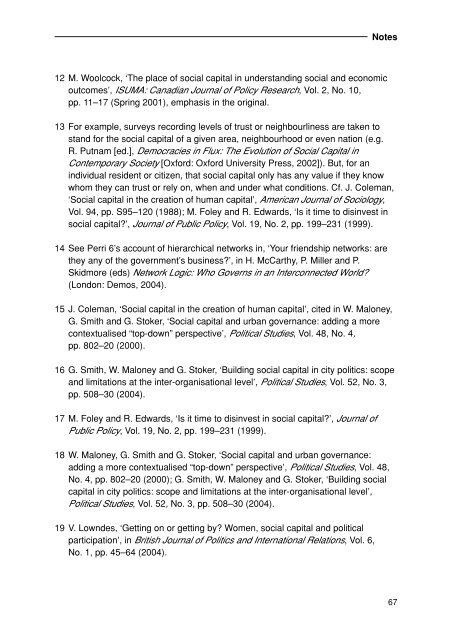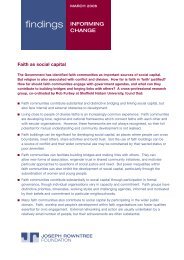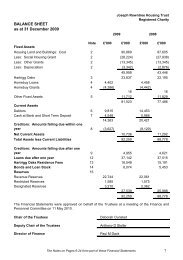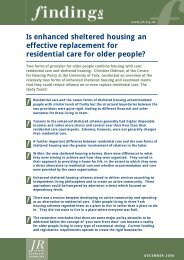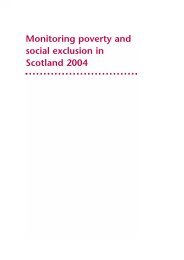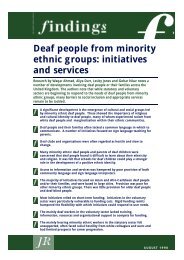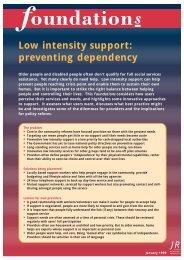Community participation - Joseph Rowntree Foundation
Community participation - Joseph Rowntree Foundation
Community participation - Joseph Rowntree Foundation
You also want an ePaper? Increase the reach of your titles
YUMPU automatically turns print PDFs into web optimized ePapers that Google loves.
Notes<br />
12 M. Woolcock, ‘The place of social capital in understanding social and economic<br />
outcomes’, ISUMA: Canadian Journal of Policy Research, Vol. 2, No. 10,<br />
pp. 11–17 (Spring 2001), emphasis in the original.<br />
13 For example, surveys recording levels of trust or neighbourliness are taken to<br />
stand for the social capital of a given area, neighbourhood or even nation (e.g.<br />
R. Putnam [ed.], Democracies in Flux: The Evolution of Social Capital in<br />
Contemporary Society [Oxford: Oxford University Press, 2002]). But, for an<br />
individual resident or citizen, that social capital only has any value if they know<br />
whom they can trust or rely on, when and under what conditions. Cf. J. Coleman,<br />
‘Social capital in the creation of human capital’, American Journal of Sociology,<br />
Vol. 94, pp. S95–120 (1988); M. Foley and R. Edwards, ‘Is it time to disinvest in<br />
social capital?’, Journal of Public Policy, Vol. 19, No. 2, pp. 199–231 (1999).<br />
14 See Perri 6’s account of hierarchical networks in, ‘Your friendship networks: are<br />
they any of the government’s business?’, in H. McCarthy, P. Miller and P.<br />
Skidmore (eds) Network Logic: Who Governs in an Interconnected World?<br />
(London: Demos, 2004).<br />
15 J. Coleman, ‘Social capital in the creation of human capital’, cited in W. Maloney,<br />
G. Smith and G. Stoker, ‘Social capital and urban governance: adding a more<br />
contextualised “top-down” perspective’, Political Studies, Vol. 48, No. 4,<br />
pp. 802–20 (2000).<br />
16 G. Smith, W. Maloney and G. Stoker, ‘Building social capital in city politics: scope<br />
and limitations at the inter-organisational level’, Political Studies, Vol. 52, No. 3,<br />
pp. 508–30 (2004).<br />
17 M. Foley and R. Edwards, ‘Is it time to disinvest in social capital?’, Journal of<br />
Public Policy, Vol. 19, No. 2, pp. 199–231 (1999).<br />
18 W. Maloney, G. Smith and G. Stoker, ‘Social capital and urban governance:<br />
adding a more contextualised “top-down” perspective’, Political Studies, Vol. 48,<br />
No. 4, pp. 802–20 (2000); G. Smith, W. Maloney and G. Stoker, ‘Building social<br />
capital in city politics: scope and limitations at the inter-organisational level’,<br />
Political Studies, Vol. 52, No. 3, pp. 508–30 (2004).<br />
19 V. Lowndes, ‘Getting on or getting by? Women, social capital and political<br />
<strong>participation</strong>’, in British Journal of Politics and International Relations, Vol. 6,<br />
No. 1, pp. 45–64 (2004).<br />
67


